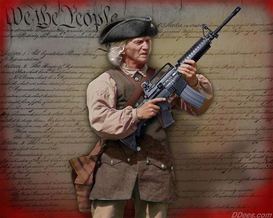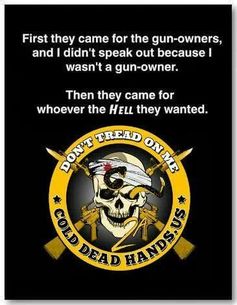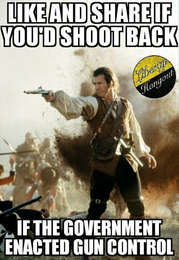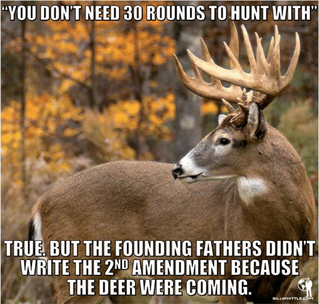 by David Barr Gun control supporters often struggle to understand the fierceness with which gun advocates oppose compromise on the issue. This struggle is understandable: if you think of guns as useful only for hunting or perhaps home defense – with the tradeoff being thousands of avoidable deaths – it is hard to see why anyone would stridently oppose all forms of gun control. It is thus important for gun control advocates to see the extent to which many gun advocates see the right to bear arms as a foundational right – perhaps even the foundational right – on which all the others depend. They will only understand that position if they see the way its roots reach into the myths of the American struggle for independence. It is likewise important for gun rights advocates to see how this belief rests on bad myths about the revolution.  When I say ‘myths,’ I don’t mean stories that are not true, but rather the sort of stories we all use to understand and communicate what matters about the world around us. For example, when we talk about the American frontier, we can use myths of the bravery and independent spirit of the pioneers and/or myths about the genocide of the native population. All of these stories might be true, but the choices we make about which of them we emphasize shape how we think about the significance of what happened (for more on my use of the term ‘myth,’ check out my earlier post on the subject). One way of mythologizing the Revolutionary War goes like this: The Revolution became unavoidable because of the unjust tyranny of the British empire. When our tolerance of its abuses reached a breaking point, we revolted. The war pitted citizen-soldiers, fighting with little but their own guns and love of liberty, against heavily-armed and rigidly trained professional soldiers. We were seriously outnumbered and under-resourced, but our independence, passion for freedom, and cunning won out over the hierarchal discipline and mercenary motivations of our opponents. Many advocates for gun ownership regularly cite this myth. It is, in fact, the source of much of the animus on that side of the debate. They believe the myth proves that a spontaneous revolt by gun-owning citizens is a viable last resort when a government overreaches its rightful limits. It is used to prove that the right to own a gun is not just an end, but rather a critically important means, of political liberty. That is to say, the myth is cited to prove, not just that we should want the government to respect the right to bear arms, but rather that gun ownership is necessary to guarantee that the government respects any of our rights. If the government were to take away our guns, the thinking goes, it would leave us defenseless against its tyranny. For many, this is such a clear implication of this myth that they simply assume that efforts for gun control are only ever a strategic move by those with tyrannical ambitions. The reason many people are unwilling to compromise on gun control is that they don’t see it as one small step toward a goal they don’t like; they see it as the decisive step by those who would take away our freedom: after they take our guns, all other liberties could be picked off one by one. Ted Cruz put the position succinctly “The Second Amendment to the Constitution isn’t for just protecting hunting rights, and it’s not only to safeguard your right to target practice. It is a Constitutional right to protect your children, your family, your home, our lives, and to serve as the ultimate check against governmental tyranny — for the protection of liberty.” Cruz is clearly referencing the myths of the revolution, particularly a quote often (wrongly) attributed to Thomas Jefferson: "The strongest reason for the people to retain the right to keep and bear arms is, as a last resort, to protect themselves against tyranny in government."  As long as this myth, this way of telling the story, is seen simply as historical record, compromise on guns will remain unlikely. Thus, the possibility of reaching common ground on guns depends on people seeing this myth as optional, as only one way of telling the story among others. The best way to make that happen is by offering an alternative story. Toward that end, let’s consider a different myth of the revolution: In the 1700s, American colonists came to realize that our relationship with Britain was costing us more than it benefited. We declared and pursued independence through collective political action in the form of the thirteen colonial governments and the Continental Congress. While private guns did play a (minor) role in the fighting, the organized forces (militias and regulars) under Washington – funded by the colonies and the Congress – carried almost the full burden of the war effort. Far from being a fight carried out by patriots with guns, it was in fact a long war of attrition between armies in which desertion and dissent were common. In the end, we prevailed because of disciplined cooperation, both within and among the colonies and between the colonies and France. We won because we figured out how to work together to build consensus, raise taxes, print money, equip an army, conduct diplomacy, and so on. I won’t be coy about my thoughts on these two myths. This is not a case for a “they both make good points” judgment. To say that we won the war because private citizens had guns is to push the truth to the breaking point. It is not just selective history; it is bad history.[1] We should all be clear: the threat of violence by armed individuals can never be the basis of freedom. Political freedom has to be achieved and guaranteed politically, that is, collectively and institutionally. We only remain free when collective power checks power, when the influence of government, money, and the citizenry are balanced and regulated by transparent and accountable enforcement institutions. Someone might find comfort in the thought that he can shoot back when the government comes for his land, but what happens when economic forces beyond our control (and even functional comprehension) come for it? Who can be shot when the country moves gradually toward plutocracy (the rule of money), even while it maintains the superficial appearance of democracy and liberty? If we hang on to the right to buy a gun in part because gun companies can buy senators and congressmen, what liberty is left for us to protect with it? We live in a massive, rapidly urbanizing and diversifying modern democracy, one embedded in an overwhelmingly complex global economic system. Privatization, deregulation, and changes in campaign laws have given sprawling business conglomerates unprecedented political power. Consumer protections are being rolled back in ways that favor big businesses that politicians depend on for reelection. There are revolving doors between the financial, energy, prison, and other industries and the government agencies meant to regulate them. We have forfeited our civil liberties because of fear. Our sources of information about the world - a basic condition of free choice - are becoming propaganda wings of political parties. It is clear from all this that we should be worried about encroaching tyranny. Threats to our freedom are constantly taking new, subtle, and dangerous forms. That said, it is a naïve fantasy to think the gun collections of American citizens can play any sort of meaningful role in protecting us from them. While gun control is an important issue with serious consequences, I really think the more fundamental danger here is the naïve view of power, freedom, and influence at play in these debates. We can argue about the benefits and dangers of guns, but what should be beyond debate is the error involved in thinking that we live in a world so simple that modern forms of tyranny can be met with an AR-15. If we think gun ownership is a necessary and sufficient defense against tyranny, how can we possibly see any value in the vital, boring work of government ethics oversight, consumer protection agencies, or campaign finance legislation? The institutions, norms, and checks that hold government responsible to the people can disappear without a moment of confrontation in which guns could conceivably play a role. The irrelevance of gun ownership to issues of freedom and tyranny means it is possible to keep our guns and succumb to tyranny or to give up our guns while fortifying our freedoms. Please note that I am not saying that keeping guns will lead to tyranny or that giving them up will help our freedom. I mean to say only that there is no reason to think – on the basis of the Revolution or anything else – that gun ownership is a significant factor one way or the other in government accountability and the freedom it makes possible. The only thing that can hold off the threat of tyranny today is the only thing that ever has: informed, collective participation in transparent and accountable political institutions. That’s the real lesson we should learn from the American Revolution. ************************************************************************ [1] I often hear gun control advocates counter this use of the myth by saying something like “well, that worked back then when citizens and the military both had only muskets and rifles; now the military has drones and tanks.” This is a mistake, I think, because it grants the possibility that armed individuals could, in principle, regulate the government. I think it is better to say that the Revolution is a bad historical parallel and talk instead about the Whiskey Rebellion. It was the same time period, same weapons. There were no federal law enforcement agencies and no standing army at the time. The government wanted a policy to take effect; armed citizens saw the federal government claiming for itself a new power and stood up for themselves. It was the ideal situation gun advocates have in mind. It did not go well for the rebels.
4 Comments
This is such an excellent short essay on the subject. I especially appreciate your precision with words-- as when you qualify your use of the term "myth." You have articulated some thoughtful observations in a manner that is refreshingly affirmative and accurate. I teach humanities (history and political science) at a Christian liberal arts college and I often take the approach you are taking when engaging students of different stances on gun regulation. Students often get defensive on this issue if it is not approached in a mature way. History, while deceptively clear cut, is tricky because so much can be shaped by the framing and use of language. And so many discussions I have overheard are crude and antagonistic. I crave a sustained national discourse in the manner of yours here. I confess that I am disappointed no one has posted a response to your essay. Please keep writing. Your voice needs to be heard and this type of conversation needs to occur. Cheers.
Reply
2/13/2023 12:31:24 am
Really helpful tips and guide that every gun owner can follow through. Thanks for it.
Reply
John David Simpson
2/27/2023 07:10:02 pm
I follow you on the "Myth" as you use it, I must admit to be aligned with those you refer to that for lack of better terms, romanticize the myth. Were I disagree with you is you can have all the political reasoning and diplomacy in the world, but without the force to back it up it ultimately becomes less relevant. Much like a superior Air Force, without an Army. They may take a territory, but they'll never control or keep it.
Reply
5/8/2024 04:48:06 am
This is a thought-provoking exploration of the intersection between gun control and the historical context of the American Revolution. It's fascinating to consider how the events of that era continue to shape our perceptions and debates surrounding firearms today. By delving into the complexities of this topic, we gain a deeper understanding of the principles and values that underpin discussions on gun rights and regulations. Thank you for shedding light on this important aspect of American history and contemporary society.
Reply
Leave a Reply. |
Archives
September 2020
Categories
All
|

 RSS Feed
RSS Feed